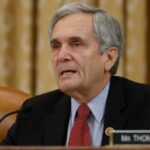
A top U.S. Department of Energy official is set on Thursday to defend President Joe Biden‘s pause on approvals of liquefied natural gas (LNG) exports at a Senate hearing called by a fellow Democrat who said he will investigate the decision.
Deputy U.S. Energy Secretary David Turk will testify before the Senate Energy and Natural Resources Committee at 9:30 ET, in a hearing called by Senator Joe Manchin, a Democrat from natural gas-producing West Virginia.
Manchin has said if the pause “is just another political ploy to pander to … climate activists at the expense of American workers, businesses, and our allies in need, I will do everything in my power to end this pause immediately.”
WHITE HOUSE HALTS ENORMOUS NATURAL GAS PROJECTS IN VICTORY FOR ENVIRONMENTALISTS
Biden paused the approvals indefinitely so his administration can take a “hard look” at the environmental and economic impacts of the booming industry.
The U.S. took the spot as the world’s top LNG exporter last year and the shipments are expected to double by the end of the decade on projects already approved.
Environmentalists and youth groups, an important part of Biden’s base, had pressured Biden to slow approvals of fossil fuel projects on concerns about their emissions of greenhouse gases. Domestic businesses ranging from chemicals, steel, food and agriculture, also oppose unrestricted exports of U.S. gas, saying it could raise fuel prices.
It is unclear how opponents of the pause can overturn it. Legislation in both the Senate and the House of Representatives would strip the Department of Energy’s power to approve exports, giving all approvals to the independent Federal Energy Regulatory Commission (FERC).
But it is hard to pass legislation in an election year. Even if it passed the House, the legislation would likely struggle in the Senate, led by Democrats.
“Even if Congress successfully intervenes, the approach of moving review to FERC and deeming exports to be in the public interest seems too strong for Democrats, and compromise language – with a murkier impact – would be likely in our view,” said Benjamin Salisbury, analyst at Height Capital Markets.
Scroll down to leave a comment:








